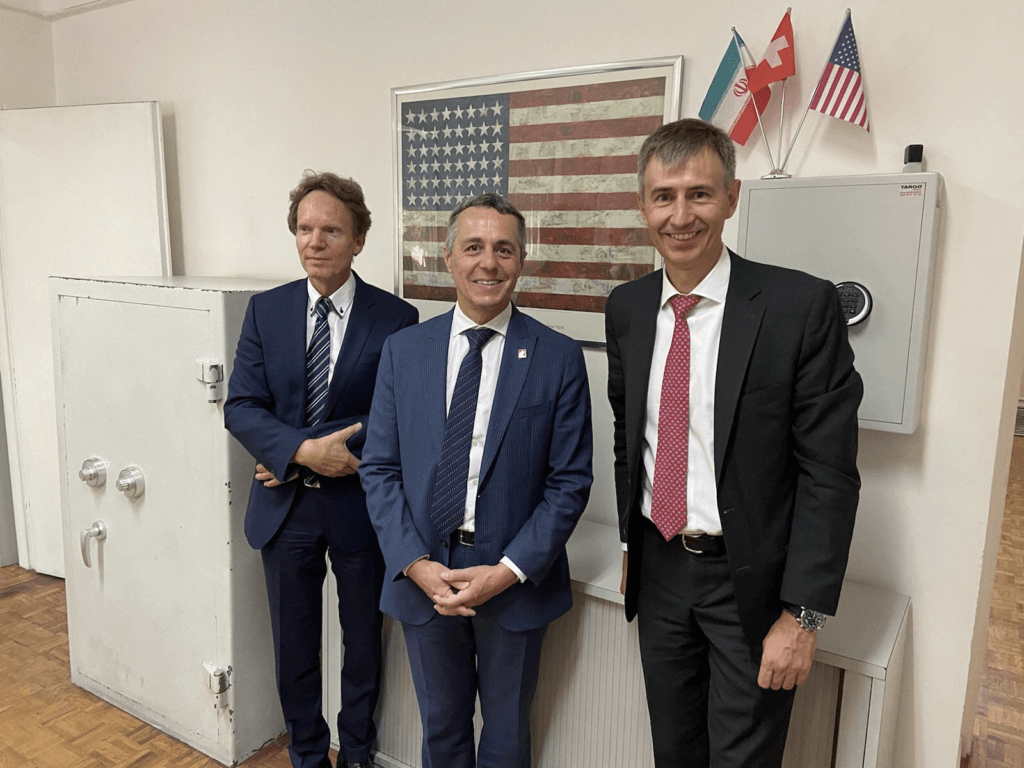
Switzerland is rightly praised for its international Good Offices. But for those at home, it looks like they’re footing the bill. Is that true?
The “Neue Zürcher Zeitung” recently reported that Switzerland is being paid around two million Swiss francs a year for its ‘Good Offices’ in the Islamic Republic of Iran on behalf of the United States.
This almost sounded as if Switzerland was making money with its diplomatic mediation efforts.
Several sources
muula.ch then asked the “Alte Tante”, as the newspaper is sometimes called, where the figure in the article actually came from. According to the authors, it came from two sources.
On the one hand, the figure was reported in an older publication by the Center for Security Studies (CSS) at the Swiss Federal Institute of Technology ETH Zurich.
In addition, the order of magnitude is mentioned in the diplomatic work by Paul Widmer “Diplomacy, a Handbook”. So everything should be about right.
Tax money for services
Official Switzerland often steps into the breach if two countries break off their relations completely or partially. Switzerland helps to maintain minimal relations between the parties involved in such a dispute. This assistance, known as Good Offices, has existed since the 19th century.
But in the end who pays for this service, that the Swiss Confederation mediates between states? Does the tax money of the Swiss people go to pay for it?
muula.ch asked the Federal Department of Foreign Affairs (FDFA) about the costs of Switzerland’s Good Offices, and what the two million Swiss francs per year for Switzerland’s most important protecting power mandate, that of the U.S.A. in Iran, is all about.
Many transitory items
A FDFA media spokesman explained that Switzerland invoices its expenses incurred for the protecting power mandate for the U.S. in Iran and that the U.S. pays for them. However, the FDFA could not comment on the specific figures, he added.
In general, protecting power mandates consist of consular and/or diplomatic activities. Switzerland invoices the states concerned for the costs incurred for consular activities, the FDFA said.
These expenses fluctuate from year to year and therefore vary considerably.
States with their own staff
In terms of personnel, only the safeguarding of interests for the United States in Iran is carried out by Swiss and local embassy staff at the Swiss Embassy in Tehran, according to a 2016 Federal Council response to the Béglé postulate.
In all other cases the represented states have largely independent interest sections staffed by their own personnel, which are nominally affiliated with the Swiss Embassy, it said.
Help for U.S. citizens
Switzerland has represented U.S. interests in Iran since 1980, and the so-called Swiss interest section in Tehran (see photo from Twitter) handles all U.S. consular matters in Iran. This includes passport applications, civil status changes or consular protection of U.S. citizens.
The protective power mandate dates back to the 1980 hostage crisis. The U.S. severed relations with Iran after Iran proclaimed the Islamic Republic, students occupied the U.S. Embassy in Tehran, and held embassy employees hostage.
No hourly wage
However, as further research by muula.ch revealed, Switzerland does not charge for its time and effort spent on diplomatic activities in protecting power mandates.
Those costs are probably also difficult to record, as the top diplomats are unlikely to write down the exact hours for the respective activities.
Wide range of services
In addition to protecting power mandates, Switzerland’s Good Offices include many other things. For example, supporting conflicting parties in their search for a negotiated solution.
Switzerland is also available for mediation or supports negotiations. Prisoner exchanges, for example, are organized with Switzerland’s help.
An important pillar of Switzerland’s host state policy is also the organization of peace conferences and peace negotiations. This could be under its own auspices, as well as under those of the UN.
Money stays in the country
As host of such peace processes, for example in Geneva, Lausanne, Zurich or in Bern, Switzerland organizes everything that involves logistics, security and protocol.
As a rule, it covers the accommodation costs of the delegations and makes the meeting rooms available, as the Federal Council’s report on the Béglé postulate further states.
This means that Swiss taxpayers’ money will be used for this purpose. However, the money remains in the country, so to speak, and supports the local economy.
Multiplier effects
Indirectly, however, all this benefits Switzerland’s good reputation and contributes to its international importance. All this is part of Swiss foreign policy and the people must therefore also bear the costs.
Ultimately, Switzerland’s good reputation as an international hub for diplomats, governments and their entourage – be it in luxury hotels or gourmet restaurants – also brings foreign money back into Swiss coffers.
So on the one hand, Switzerland is not left sitting on consular expenses. And through the expenditures of the Good Offices, which diplomacy provides and which are borne by Switzerland, new money also flows back into the country.
12.12.2022/kut./ena.







Excellent post! I appreciate the effort you put into explaining this topic.
Your article addressed the common misconceptions and clarified the facts. If you’re curious about debunking more myths
I appreciate the emphasis on ethical and sustainable money-making strategies that align with one’s values and contribute positively to society. It’s a conscious approach to success.
Your writing style is relatable and down-to-earth, making readers feel like they can apply the money-making strategies in their own lives.
I appreciate your in-depth analysis of this topic.
Great job on your blog post! The content was engaging and relatable, and I found the personal anecdotes and stories you shared to be inspiring.
Thank you for sharing success stories and case studies that demonstrate the effectiveness of different money-making strategies. They serve as inspiration and motivation.
Great work on your blog post! It was evident that you conducted extensive research, and I found the evidence and data you presented to be convincing. I appreciated the practical strategies and the actionable steps you outlined.
I admire the depth of research evident in your post. It’s well-supported and backed by credible sources.
Thank you for providing such an informative and well-structured blog post. The information you shared was valuable and supported by credible sources.
Great work on your blog post! The information you shared was relevant and practical. I found it valuable for my own personal and professional growth.
Your post offers valuable insights into various money-making strategies. It’s a great resource for those looking to diversify their income streams.
This article is well-researched and informative.
Thank you for sharing this informative and thought-provoking blog post. I appreciated the unique perspective you brought to the topic and the fresh insights you provided.
Your storytelling skills kept me engaged from beginning to end.
Thank you for sharing this informative and well-organized blog post. The information you presented was practical and actionable, making it easy for readers to implement your suggestions.
Your writing style is approachable and informative, making readers feel empowered to take action in their money-making journey.
This is exactly what I was looking for. Thanks for sharing your expertise.
Great job on your blog post! The content was well-researched and presented in a way that was easy to follow. I found it informative and engaging.
I appreciate the real-life examples and case studies you’ve included in your post. They make the content relatable and applicable.
I enjoyed reading your blog post. It was well-written and engaging.
Your writing style is engaging and relatable, making the concepts and strategies you’ve shared accessible to a wide range of readers.
This blog post is a great resource for anyone seeking information on this topic.
Your writing style is clear and concise, making complex money-making concepts accessible to readers. It’s easy to follow along and understand the strategies you’ve shared.
Your post is well-structured and organized, making it easy to navigate and find the information I need.
I appreciate the emphasis on the importance of networking and building relationships when pursuing money-making opportunities, as collaborations and partnerships can open new doors.
Your blog post was a treasure trove of valuable information. I appreciate the effort you put into gathering and presenting the content. Keep up the excellent work!
Your blog post was a valuable read. I found the content to be informative, and I appreciated the way you addressed potential challenges and provided solutions.
Your post explores the potential of leveraging technology and digital platforms to create scalable income streams. It’s a forward-thinking approach in today’s digital age.
Thank you for highlighting the importance of financial literacy and educating oneself about money management. It’s an essential foundation for long-term financial success.
Your post showcases the power of passive income and the potential it holds for achieving financial independence. It’s a motivating reminder to build assets that generate money even when we’re not actively working.
Your writing style is engaging and relatable, making the concepts and strategies you’ve shared accessible to a wide range of readers.
Your post offers practical tips for saving money and managing personal finances, creating a solid foundation for making money. It’s a valuable skill set to develop.
Your post emphasizes the importance of make money online.
Your ability to break down complex concepts into understandable information is commendable. Thank you for sharing your knowledge.
Your writing style is engaging and encourages readers to think creatively about money-making opportunities. It challenges the traditional mindset and opens up new possibilities.